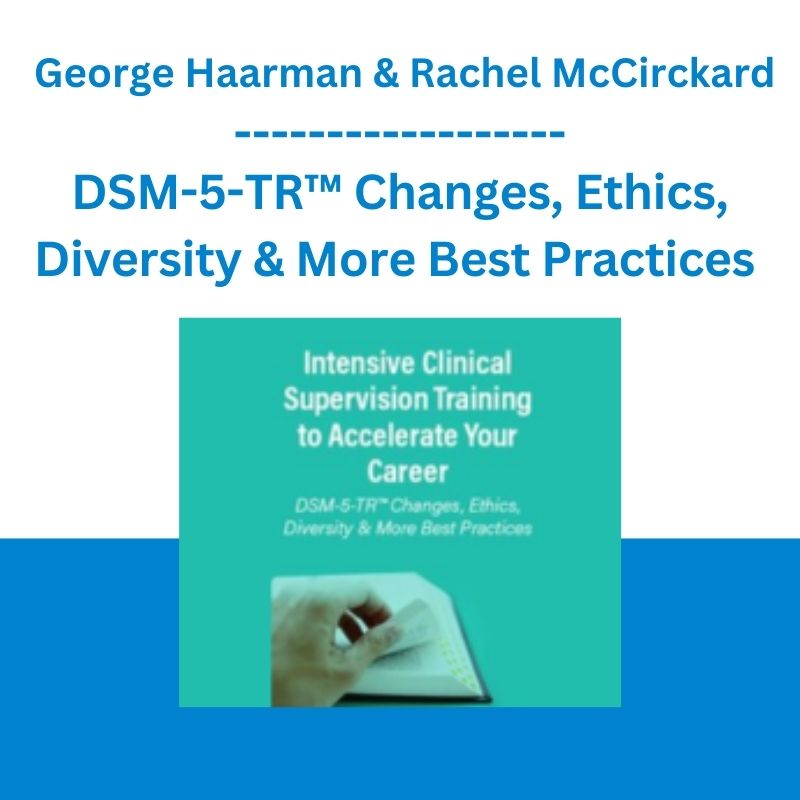*** Proof of Product ***
Exploring the Essential Features of “Intensive Clinical Supervision Training to Accelerate Your Career: DSM-5-TR™ Changes, Ethics, Diversity & More Best Practices – George Haarman & Rachel McCirckard”
Whether you’ve been doing clinical supervision for a while or you’ve been considering becoming a supervisor…
It can be difficult to balance with your own caseload and other responsbilites… And, it can be tough to find the time to keep up with changes in the field.
That’s why we’ve brought together this amazing training. Here’s your chance to get it all.
You’ll discover in-depth clinical supervision training AND explore current issues to help you take your supervisory role to the next level, all for one great price!
Gain applicable skills to navigate real-world supervision challenges and avoid mistakes that can harm supervisees and clients!
- What to do when you feel bogged-down by paperwork
- Real-world ethical problems – simplified!
- Get the confidence to avoid cultural, ethical or other mis-steps
- Stay on top of new disorders, changing criteria, specifiers & coding updates
Plus, get strategies to help you refresh and reinvigorate to be the best supervisor you can be!
Become the go-to-supervisor your supervisees will never forget!
Here’s What You’ll Learn
Best Practices in Clinical Supervision: A Blueprint for Providing Effective and Ethical Clinical Supervision
George Haarman, PsyD, LMFT
Get training on the most essential aspects of supervision including legal, ethical, diversity, risk management, consultation, working with audio or video sessions, liability & so much more! Become the most confident, competent and sought-after supervisor that you can be!
Establish Roles & Responsibilities
- Administrative vs. clinical supervision
- Role of the clinical supervisor
- Teaching supervisees how to use supervision effectively
- Assisting supervisees in taking an active role
Choose the Most Effective Supervision Model
- Developmental models
- Psychotherapy based models
- Integrative models
- Parallel process model
- The supervisee as “patient”
Master Effective Techniques & Methods
- Multicultural supervision
- Individual vs. group supervision
- Co-therapy vs. co-responsibility
- Case consultation
- Written activities and case notes
- Live observation
- Interactive live supervision
- Audio and video recording of sessions
- Experiential methods
Avoid & Resolve Common Supervision Problems
- Ethical
- Supervisor competence
- Informed consent
- Boundary issues
- Dual relationships
- Supervisor/supervisee obligations
- Incompetent or impaired supervisees
- Sexual attraction
- Confidentiality
- Documentation
- Evaluation and feedback
Common Supervision Problems continued…
- Legal
- Vicarious liability
- Standard-of-care
- Negligence
- Confidentiality vs. privilege
- Duty to warn/report
- Due process
- Risk management
- Knowledge of ethical codes and mental health law
- Supervision contracts
- Boundaries of competence
- Consultation supervision
- Documentation
- Ongoing training in supervision
- Liability insurance coverage
- Insuring confidentiality
- Supervisory malpractice
Properly Evaluate Supervisees & Your Supervision
- Formative vs. summative evaluations
- Criteria for evaluation
- Standardization of methods
- Self-evaluation
- Objective evaluation tools
- Supervisory evaluation
- 360-degree feedback
- Develop a supervisory plan
Plus, case studies throughout!
Online Clinical Supervision: Best Practices for Every Clinician
Rachel McCirckard, MFT, AAMFT Supervisor
Tele-supervision solves a lot of problems – particularly for licensees who don’t have access to high quality, affordable clinical supervisors, and even more so for clinicians who are seeking supervision within a specific specialty such as multicultural counseling or LGBTQ populations.
You’ll get essential training on:
- How states are shifting licensure rules to allow online supervision
- Recent research on the efficacy of tele-supervision
- Writing effective supervision contracts – don’t miss any details!
- Best practices for establishing an online clinical supervision presence
- How to overcome the challenges & limitations of tele-supervision
- Ways to avoid ethical mistakes & enhance supervisee learning
Become a more confident supervisor whether you’re working online, in-person or hybrid!
TWO BONUSES – FREE CE TRAINING & ARTICLE
Comprehensive DSM-5-TR™ Updates: New Diagnoses, Coding Changes & Cultural Considerations
George Haarman, PsyD, LMFT
Neglecting new diagnoses, making coding errors & culturally insensitive language faux pas can be time-consuming, frustrating & cause you to lose clients. But… it doesn’t have to be that way. Quickly and efficiently learn the updates to DSM-5-TR™! You’ll get everything you need to know on:
- New disorders including prolonged grief, suicidal behavior disorder & more!
- Specific suicidal considerations for each disorder
- Updated language for gender dysphoria, dysthymia, delirium & more
- Criteria changes for existing disorders & WHY
- How to apply over 50 coding changes and new V-code specifiers
- Cultural considerations, history, controversies, philosophy & more
- Avoiding ethical diagnostic mistakes and best practices for DSM use
AND you’re getting an intimate Psychotherapy Networker article from Meghan Winter exploring what today’s therapists-in-training REALLY need from you!
Please see the full list of alternative group-buy courses available here: https://lunacourse.com/shop/










 Trade Like Mike - The TLM Playbook 2022
Trade Like Mike - The TLM Playbook 2022  Toshko Raychev - Profit System + ITF Assistant
Toshko Raychev - Profit System + ITF Assistant